Abracada…What?
- Designer: Gary Kim
- Publisher: Z-Man Games/ Korea Boardgames
- Ages: 7+
- Time: 30 min
- Players: 2-5
[Editor’s Note – The initial part of this review is a repost of Nathan Beeler’s December 2014 piece. The second portion of this review looks at the new English version released by Z-Man this month.]
Initial Review posted by: Nathan Beeler 12/09/2014
Open, Says Me
Abraca…What? can be an enchanting experience for those who are receptive to its charms. Laughter and merriment tend to fill the aether when the game is played by a spirited group. But the converse is also true: those approaching it with a dry analytical mindset may win the game, but in the end they’ll lose all the magic. Abraca…What? seems to reflect back and amplify what its players bring to it. Speak fun, and enter.
A La Hanabi
Players take on the roles of rival wizards, competing to be the first to climb to the top of the cursed tower and claim victory, or so the rulebook would claim. Somehow the act of temporarily killing one of your fellow mages lets you climb the tower faster, but nevermind that. The point is that you and your friends will be hurling spells around in an attempt to undo each other. Thankfully, there’s no player elimination because as soon as someone “runs out of life” the round ends, points are awarded, and everything is reset for the next round.
Spells in the game take the form of the wonderfully tactile spellstones, which are placed face-down in a communal pool. Everyone takes five of the generally hurt you/heal me spells as their own. The twist in Abraca…What? is a literal twist taken straight from the pages of Hanabi and Code 777’s spellbooks: no one is allowed to see the fronts of their own spellstones. Your stones are turned to face the other players. By looking at what everyone else has in front of them, seeing what’s already been cast, and possibly factoring in what other players aren’t attempting to cast, you can make educated guesses about what your own spellstones are. The communal pool means you can’t be certain, so your conjuring is left with a bit of conjecture. Guess correctly, and you successfully cast the spell. You can even try casting more spells. But guess poorly, and you end up whacking yourself for a life point, possibly even killing yourself.
Staying alive in a given round is good. Being the wizard to deliver a coup de grâce is even better. Casting all five of your spells on your turn is the best of all, when it comes to scoring. Whichever way the round ends, player tokens are moved closer to the top of the cursed tower. If someone reaches the very top, they are the winner of the game.
Hocus Pocus Focus
Spells have numbers which tell you how many of them there are in the whole game, and to some degree how strong they are. This ranges from the one potentially powerful Ancient Dragon to the eight tepid Magic Drinks. If you don’t see either of the two Dark Wanderers and you’re relatively healthy, you might take a shot at summoning one. Since your spells have to be cast in ascending numerical order, you can’t really play it safe and heal up before going for the presto-gusto. That nifty little rule amps up the danger and tends to shuffle people a little quicker toward their doom. Play it safe and the best you can hope to do is stay alive, which is not a recipe for ultimate success either. Plus, it’s just more fun to try the stronger magics.
The fun factor really shines through in how you cast a spell and how you react to its success or failure. “I cast 6. I failed? Ok, next.” plays very differently than wildly waving your arms as you incant a freezing death ray on your left hand neighbor with a cry of “Enjoy my blizzard, scum!” I’ve been assured that you don’t have to play it up that much to enjoy the game, but the one time I saw the game truly crap out was with players who were having none of the role-playing aspect. It feels important to me.
Bibbidi-bobbidy-boo-ya!
Technically, there isn’t a whole lot to the game. It’s a little bit of deduction and a whole lot of whimsy. Decisions are not generally difficult, and luck levels are about what you’d expect for a shorter game of this sort. Even still, there’s something to it that I find very appealing. Maybe it’s the artwork by Marie Cardouat, of Dixit fame. Maybe it’s the make-believe the game encourages. Maybe it’s some other bit of witchcraft. Whatever it is, consider me entranced.
Opinions from Other Opinionated Gamers
Lorna: (1 play) Very light hearted deduction game. Ok mostly it seems like guessing game, more deduction than it appears and it’s charming.
Craig Massey: (2 plays) There needs to be more deduction games. This one scores points because it is fun, quick, and accessible. The artwork is fantastic and the theme is very appealing and actively works with the mechanics to make a game that is highly enjoyable.
Ben McJunkin: (1 play) With this game, I’m more of the dry, analytical player than the arm-waving role-player. It is perhaps no surprise then that I found the game cute, inoffensive, but a little flat. Since you get to go again after successfully casting a spell, the smart move is generally to simply choose the lowest-numbered spell that you have the highest odds of successfully completing. This is literally just counting. You can infer a bit of information from other players’ behavior, but the game doesn’t provide much room for players to contribute their individual skills. I struggle to see how someone might significantly outplay their opponents, for example: you can count, I can count, we’re probably going to perform about equally well.
Dan Blum (3? plays): This is a lot of fun, even without role-playing; if your group is into that, go for it, but everyone I’ve played it with has enjoyed it without that. That being said, as Nate points out this isn’t a heavy deduction game; if that’s what you want play Code 777 instead (it’s also an excellent game). On the other hand, there’s certainly more to it than Ben thinks; I can promise you his suggested strategy will not usually work. Counting is obviously necessary, but you also have to make inferences based on other information, and the fact that a round ends when someone runs out of life (and you get points for causing it) means that has to be taken into consideration.
Joe Huber (2 plays): Dan has summed up most of my thoughts. This is a delightful game, and earns big points for me by involving deduction without being purely a deduction game – much as with Timbuktu, another favorite of mine. Here, the game is closer to a deduction game – but as players earn nearly as much of an edge for eliminating an opponent as for simply deducing all of their spells, there’s significant room for strategic play. This could grow to be my favorite new release from Essen 2014.
Dale Yu (4 plays): I love this one. It is a light hearted deduction game – a combination not often found. I’ve played this a bit with my boys, and we definitely get into the theme and zap each other with spells. I do think that there is plenty of room for skill here – or at least reward for high risk plays. Also, I’m not likely to get a great game of Black Vienna or Code 777 with my kids right now, so this really fits a niche for me.
Larry (2 plays): I think Nathan summarized the game’s strengths and weaknesses very well. We didn’t find all that much to the game, but if the players provide the fun, which is what happened with us, a good time can be had by all. However, that tends to get old after a bit; after all, there are plenty of games with good rollicking fun which do have good gameplay. I’d probably be happy to play this once a year or so, but if I never managed to play this again, I wouldn’t be too depressed.
Greg S: I played this twice in succession and both games ended without one player ever getting a turn. Both times one player was adept at deduction and successfully won the game on his very first turn. Of course, this considerably reduced the enthusiasm of all at the table, squashing any desire in me to play it again.
Ratings Summary from the Opinionated Gamers
- I love it!… Nathan Beeler, Dan Blum, Dale Y
- I like it… Lorna, Craig, Joe H,
- Neutral… Ben McJunkin, Larry
- Not for me…Greg S.
—–
Re-review of Abraca-what?
As I mentioned at the top, Z-Man has released an English version bringing this nearly impossible-to-find gem to the gaming masses! There are a few changes (mostly cosmetic) that are worth mentioning.
- Box Size – the Z-Man version of the game is slightly larger than the original Korean box. This likely has more to do with the use of a “standard” sized box from Z-man’s perspective than anything else. However, it is not the usual 30cm square that you’d expect – this one is closer to 27cm which actually is still a bit non-standard. The one nice change of this (not sure if this was intended or not) is that I no longer have to specifically align the pieces in a rectangular array to get them all to fit in the box nicely.
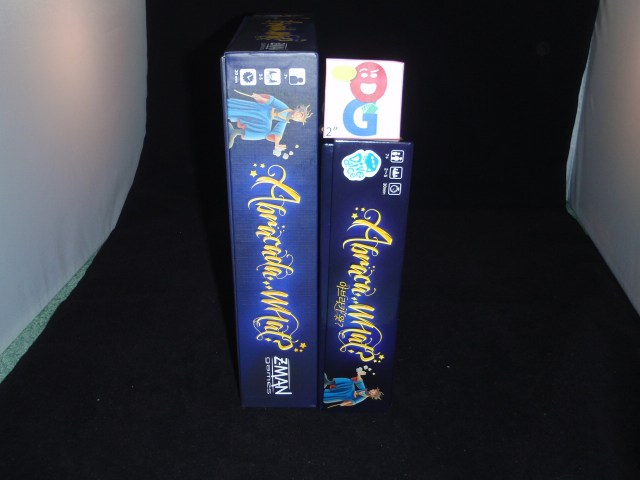
From the side. My scale marker on top of the 1st edition box – there is almost exactly 2″ difference in size
- Components – the components are mostly identical. The plastic pieces are the same as are the shiny cardboard inserts that are held within. The player discs are also the same. The one change that I noticed, which is a significant improvement to the game IMHO, is the addition of a small scoring track to the bottom right of the scoreboard. In the original version, you were asked to score along the left column of the board which obscured the numbers and sometimes gave the impression that there was an extra space for the plastic pieces. The standalone scoring track removes all of the confusion. A great addition!
- Artwork – other than the added scoretrack to the board, the art appears to be the same. However, the Z-Man version seems to have more vibrant colors (or maybe looks less washed out). Not sure if this has to do with the method of printing or if the art was re-colored via Photoshop — but the brighter colors do look a bit better in the Z-Man version.
Updated Thoughts on Abraca-what? from the Opinionated Gamers
Dale Yu (now >15 plays): I loved this one after the first four plays back in December. Now, I’ve brought the game to two gaming conventions, and at each one, it was one of the “hits of the show”. I don’t think that my copy ever rested for more than about an hour at Gulf Games. It was constantly in play, and there was always a bunch of laughter and cheering when it was on the table. It is a well deserved recommended game for the 2015 Spiel des Jahres, and I would not have been surprised if it would have garnered a full nomination. It is easy to grasp, though there is plenty of room in the game for subtle play as well as adventurous risk taking.
I now have two copies of the game (one review copy from Dive Dice at Essen and a newer one from Z-Man), and both will proudly stay in the game collection(s) at home. My boys love the game, and they were thrilled to know that they will now get their own copy for their room, and I’ll keep one for the permanent collection. More than anything else, that might tell you how much I like the game – we’re keeping two copies in the house!
Joe Huber (7 plays): While it took longer than I had hoped to pick up a copy of Abraca…What?, I was thrilled to finally do so, and it’s starting to see regular play with my game groups. One thing that I’ve found is that many seem to dismiss the game as a lighter deduction game – but, while it’s not a heavy game, there is a _lot_ of room for deduction and clever play. Unlike most games including deduction, this one isn’t focused on finding the solution. Instead, players can adjust their play based upon how much danger they are in based upon what their opponents hold, and how close they are to death themselves.
Mark Jackson (2 plays): I’m not a fan of deduction games – but this one is light, enjoyable and fun to play… and it also got a big thumbs up from my teenage gamer son. (And I’m not dismissing it by calling it “light”… I’m complimenting it on how it doesn’t feel plodding & lifeless like some deduction games.)
Patrick Korner (5 plays): What can I say, I love me this game. Don’t play with boring people because the game is excellent at mirroring the mentality of the group – i.e. fun people = fun game. Ancient Dragon for the win!
Dan Blum: I’ve played several more times since the initial review and still enjoy the game a lot, and will definitely pick up the Z-Man edition.
I do note that Dale missed one change that was made: the title of the Z-Man edition is Abracada… what?, which all right-thinking people will agree is not as good as the original. However, that’s a very minor issue.
Updated Ratings from the Opinionated Gamers
- I love it!… Nathan Beeler, Dan Blum, Dale Y, Joe H, Patrick Korner
- I like it… Lorna, Craig, Mark Jackson
- Neutral… Ben McJunkin
- Not for me…

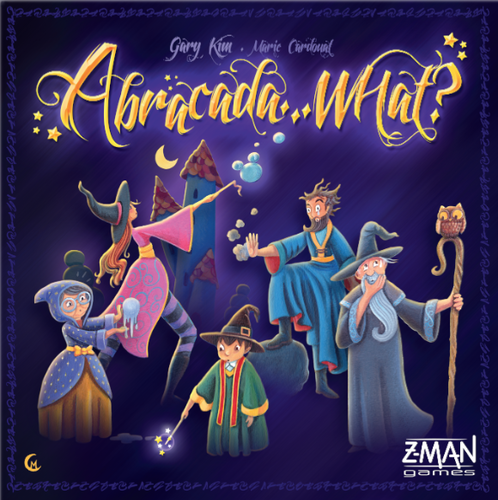
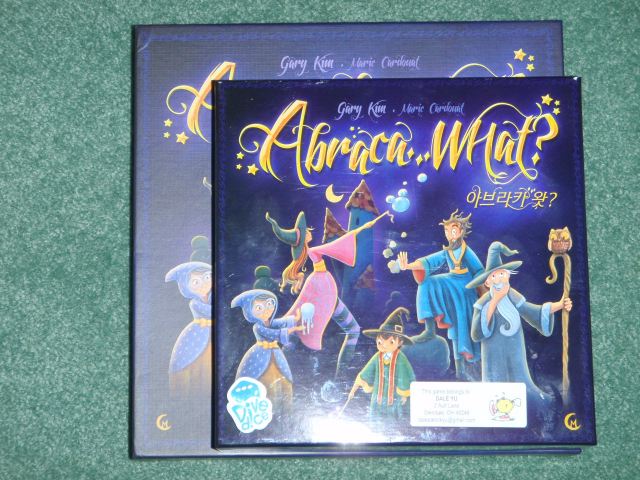
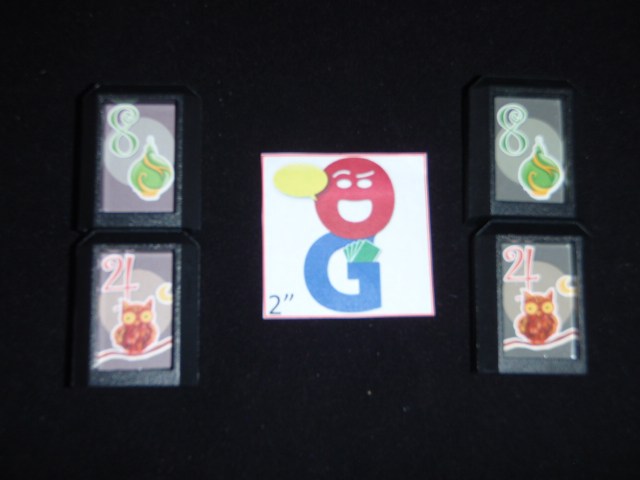
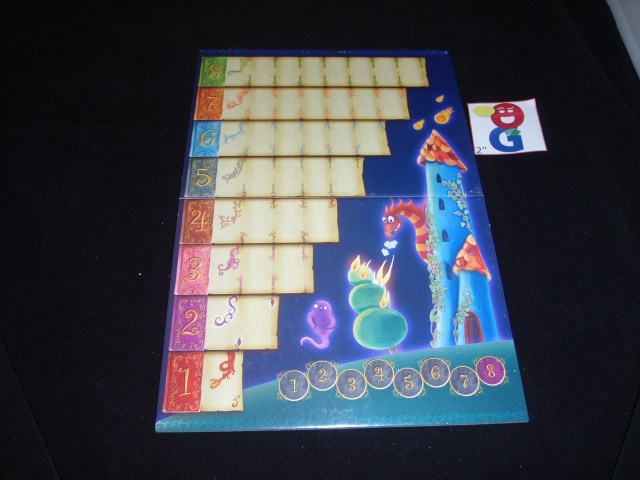
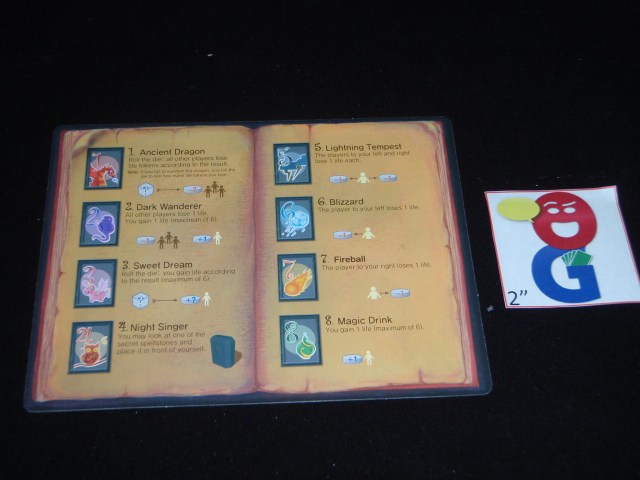
I finally broke down and picked it up last week. After hearing all the comments, I was expecting an inoffensive game that might end up being fun. First off, the kids loved. My oldest daughter (who I often have to drag to the table) immediately asked to play it again. Second off, there is a lot more deduction than I was expecting. The kids used the strategy of just picking the number they thought the best. I used Ben’s strategy from above (count the pieces showing and pick the lowest number with the best odds) along with some added value for the possibility of knocking someone out. However, I saw the possibility of getting additional clues from what people were playing. It was more thinking than I felt like doing, but I could see the additional depth if people wanted to play it that way. For my family, we just liked trash talking and misdirecting (“come on, throw a fireball at me, I see it right in front of you” :D ). Really excited to get more plays of this!